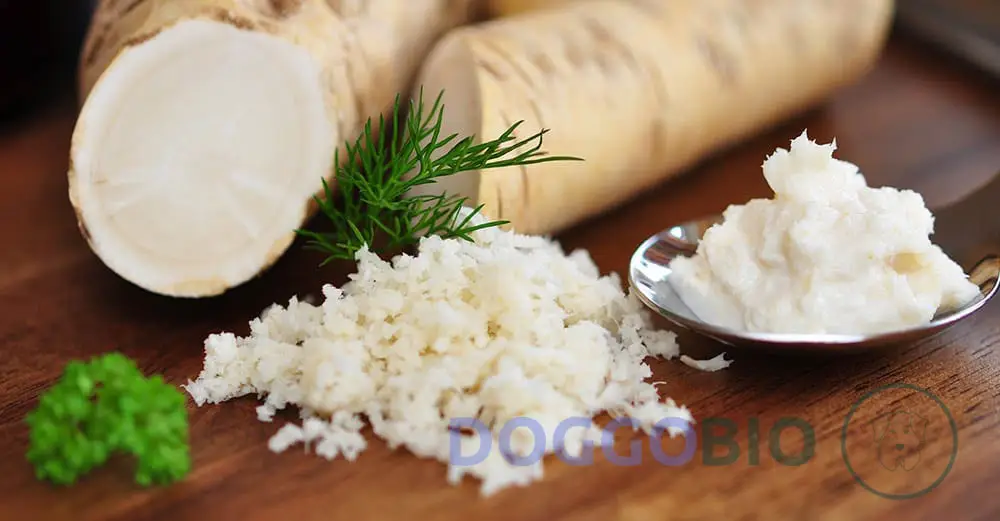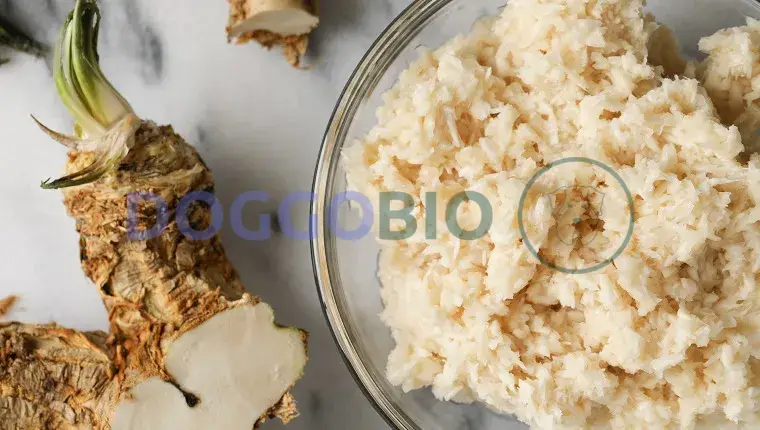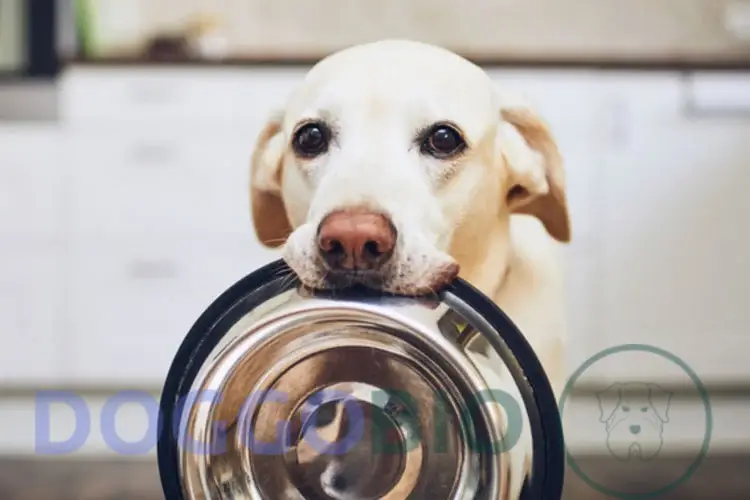As pet owners, we are constantly vigilant about what foods our furry friends can safely consume. One common question often arises is, “Can Dogs Eat Horseradish?”. Horseradish, known for its intense aroma and sharp, spicy flavor, is a common condiment in many kitchens. But is it safe for our canine companions?
The short answer is no, dogs should not eat horseradish. While a small amount might not cause immediate harm, horseradish contains compounds that cannot be very pleasant to a dog’s digestive system.
In this article, we’ll delve deeper into why horseradish is not recommended for dogs and what potential risks it poses to their health. We’ll also explore safer alternatives to satisfy your dog’s curiosity for new tastes without compromising their well-being.
Can Dogs Eat Horseradish?

No, it’s not recommended. Horseradish contains compounds that irritate a dog’s mouth, throat, and digestive system, potentially leading to diarrhea and vomiting.
The Nutritional Value of Horseradish for Dogs
Horseradish is low in calories and contains vitamins C, B6, and B9 and minerals like calcium, magnesium, and potassium. It also has anti-inflammatory and antibacterial properties, making it a potentially beneficial addition to a human’s diet.
However, when it comes to dogs, their nutritional needs are different from ours. While some of the nutrients found in horseradish may benefit dogs, they can also get them from their regular dog food. Plus, the potential risks of feeding horseradish to dogs outweigh any potential benefits.
The Risks of Feeding Horseradish to Dogs
While small amounts of horseradish may not cause immediate harm to your dog, it’s essential to understand the potential risks involved.
- Horseradish contains isothiocyanates, which can cause irritation and inflammation in a dog’s digestive system. This can lead to symptoms such as vomiting, diarrhea, and abdominal pain.
- In addition, horseradish can also cause an allergic reaction in some dogs. If your dog has a known allergy to other plants in the mustard family, such as mustard greens or Wasabi, they may also be allergic to horseradish. Allergic reactions can range from mild symptoms like itching and hives to severe reactions like difficulty breathing and anaphylaxis.
What to Do If Your Dog Eat Horseradish?

If you suspect your dog has eaten horseradish, acting quickly is essential.
- First, determine how much horseradish your dog has consumed and if they show any symptoms. If your dog has only eaten a small amount and has no signs, monitor them closely for the next 24 hours.
- However, if your dog has eaten a large amount of horseradish or is showing symptoms of toxicity, it’s best to seek veterinary care immediately. Your vet may induce vomiting to remove the horseradish from your dog’s system or provide supportive care to manage their symptoms.
Symptoms of Horseradish Toxicity in Dogs
If your dog has consumed a lot of horseradish or is showing symptoms of an allergic reaction, it’s essential to seek veterinary care immediately. Some common symptoms of horseradish toxicity in dogs include:
- Vomiting
- Diarrhea
- Abdominal pain
- Drooling
- Pawing at the mouth
- Difficulty breathing
- Swelling of the face, throat, or tongue
- Itching
- Hives
- Collapse
If left untreated, horseradish toxicity can lead to more severe complications, such as dehydration, electrolyte imbalances, and even death.
Alternatives to Horseradish for Dogs
Now that we’ve established that horseradish is unsafe for dogs to consume, you may wonder what alternatives you can use to add flavor to your pup’s meals. Here are a few safe options to consider:
- Turmeric: This spice has anti-inflammatory properties and can add a mild, earthy flavor to your dog’s food.
- Ginger: Like horseradish, ginger has anti-inflammatory and antibacterial properties. It also has a spicy kick that can add some flavor to your dog’s meals.
- Parsley: This herb is safe for dogs and can help freshen their breath. Plus, it adds a touch of green to their meals.
- Cinnamon: Cinnamon can be a safe and tasty addition to your dog’s food in small amounts. Just use the plain variety without any added sugar or artificial sweeteners.
Foods That Are Toxic to Dogs

While horseradish may be off-limits for dogs, many other foods can be toxic. As a responsible pet owner, you must be aware of these foods and keep them out of your dog’s reach. Some common foods that are toxic to dogs include:
- Chocolate
- Grapes and raisins
- Onions and garlic
- Avocado
- Xylitol (a sugar substitute found in many sugar-free products)
- Alcohol
- Macadamia nuts
- Raw dough or batter containing yeast
- Coffee and caffeine
- Salt and salty snacks
If your dog consumes any of these foods, it’s essential to seek veterinary care immediately.
Some Posts You Wanna Read More
- Can Dogs Eat Potato Salad?
- Can Dogs Eat Cabbage?
- Can Dogs Eat Cilantro?
- Can Dogs Eat Coleslaw?
- Can Dogs Eat Egg Salad?
- Can Dogs Eat Jicama?
- Can Dogs Eat Lima Beans?
- Can Dogs Eat Mushrooms?
- Can Dogs Eat Okra?
Frequently Ask Question
Can puppies eat horseradish?
No, puppies should not eat horseradish. Their digestive systems are still developing, making them more sensitive to potential irritants and allergens. It’s best to stick to a puppy-specific diet recommended by your vet.
Can dogs eat horseradish sauce?
No, dogs should not eat horseradish sauce. In addition to the potential risks of consuming horseradish, many horseradish sauces also contain other ingredients that can be harmful to dogs, such as onions and garlic.
Conclusion
In conclusion, when it comes to “Can Dogs Eat Horseradish?” the answer is clear: it’s best to avoid feeding horseradish to your dog. While a tiny amount may not lead to immediate or severe health issues, the potential risks associated with its robust and spicy nature can lead to discomfort and digestive problems for your pet.
As responsible pet owners, our priority should always be the health and safety of our furry friends. Plenty of dog-safe foods and treats that are delicious and beneficial for their health are available.
Remember, it’s always wise to consult with your veterinarian when in doubt about any human food. By being cautious and informed, we can ensure our dogs lead happy, healthy lives without the risks posed by unsuitable foods like horseradish.

Pingback: Can Dogs Eat Potato Salad? Navigating Safe Snacking! 2024